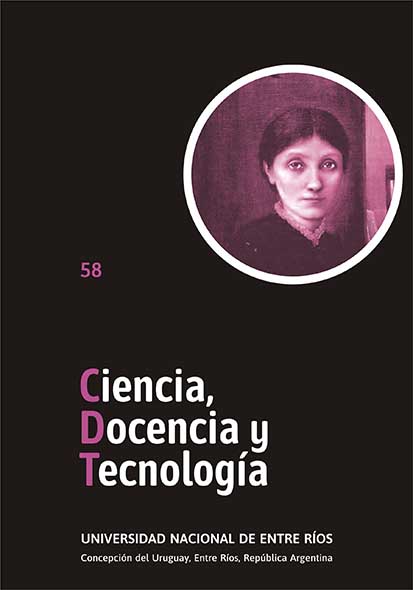Abstract
In this work we provide, coping with the thematic complexity in the transdisciplinary domain known as Science-Technology & Society (sts), an ordering axis capable of providing
foundation for a curricular space as the one proposed in Ciudad de Buenos Aires under the name «Scientific Problems with Social Impact». Such an ordering axis is surrounded by
a number of topics of philosophical importance triggered by the premise known as Precaution Principle, topics relevant for educating citizens. The analysis of such topics constitute
a program of investigation which we will call «Precautionary Philosophy». We will analyze the suitability of Ciudad de Buenos Aires’ proposal and show how our axis can accomplish
the requirements demanded by its Education Ministry. We will also evaluate the theoretical framework used by the Ministry in the curricular space’s foundation and show how the Precautionary Philosophy is compatible and even improves such framework.
References
ADORNO, T., HORKHEIMER, M. (1998). Dialéctica de la ilustración: fragmentos filosóficos. Madrid: Trotta.
ALBORNOZ, M., KREIMER, P., GLAVICH, E. (1996). Ciencia y sociedad en América Latina. Bernal: Universidad de Quilmes.
BECK, U. (1992). Risk Society: Towards a New Modernity. London: Sage.
BIJKER, W. (2005). ¿Cómo y por qué es importante la tecnología?, en Redes, 11(21): 19-53.
CORTASSA, C. (2010). El aporte de la Teoría de las Representaciones Sociales a los estudios de Comprensión Pública de la Ciencia, en Ciencia, Docencia y Tecnología, XI(40): 9-44.
DRUCKER, P. (2004). Post-Capitalist Society. New York: Routledge.
ESTÉBANEZ, M.E. (2007). Ciencia, tecnología y políticas sociales, en Ciencia, Docencia y Tecnología, VIII(34): 13-63.
FEENBERG, A. (2012). Transformar la tecnología. Bernal: Universidad de Quilmes.
FEYERABEND, P. (2001). Cómo defender a la sociedad de la ciencia, en Revista de la Universidad Bolivariana, 1(1): 1-8.
FULLER, S. (1997). Constructing the High Church-Low Church Distintion in STS Textbooks, en Bulletin of Science, Technology & Society, 17(4): 181-183.
FUNTOWICZ, S., RAVETZ, J. (1994). The Worth of a Songbird: Ecological Economics as a Post-Normal Science, en Ecological Economics, 10(3): 197-207.
GALIETA NASCIMENTO, T., VON LISSINGEN, I. (2006) Articulações entre o enfoque CTS e a pedagogia de Paulo Freire como base para o ensino de ciências, en Convergencia, 13(42): 95-116.
GARDINER, S. (2006). A Core Precautionary Principle, en Journal of Political Philosophy, 14: 33-60.
GERENCIA OPERATIVA DE CURRICULA DEL MINISTERIO DE EDUCACION DE LA CIUDAD DE BUENOS AIRES (2015). Diseño curricular: ciclo orientado del bachillerato de ciencias naturales. Ministerio de Educación de la Ciudad de Buenos Aires. Disponible en < http://www.buenosaires.gob.ar/sites/gcaba/files/nes-co-cs-naturales_w_0.pdf >. [15 de mayo de 2017].
GÓMEZ, R. (2014). La dimension valorativa de las ciencias: hacia una filosofía política. Bernal: Universidad de Quilmes.
GORDILLO, M., OSORIO, C., LÓPEZ CEREZO, J.A. (2000). La educación en valores a través de CTS. Organización de Estados Iberoamericanos. Disponible en <http://www.oei.es/salactsi/mgordillo.htm > [15 de mayo de 2017].
KREIMER, P. (2007). Estudios Sociales de la Ciencia y la Tecnología en América Latina. ¿Para qué? ¿Para quién?, en Redes, 26: 55-64.
LÓPEZ CEREZO, J.A. (1998). Ciencia, Tecnología y Sociedad: el estado de la cuestión en Europa y Estados Unidos, en Revista Iberoamericana de Educación, 18: 41-68.
LÓPEZ CEREZO, J.A. (2017). Cultura científica: paradigmas, tendencias y crítica social. (pp. 13-32). En MIGUEL, H., et al. (eds.). Ciencia, tecnología y educación: miradas desde la filosofía de la ciencia. Montevideo: Byblos.
LYOTARD, J.F. (1987). La cuestión posmoderna. Madrid: Teorema.
MIGUEL, H. (2016). Perspectivas en Ciencia y Tecnología en Sociedad: de las herramientas a los riesgos, en Tecnología & Sociedad, 5: 25-54.
MIGUEL, H. (2017). Conocimiento científico, disenso razonable y formación ciudadana. (pp. 33-52). En MIGUEL, H., et al. (eds.). Ciencia, tecnología y educación: miradas desde la filosofía de la ciencia. Montevideo: Byblos.
MITCHELL, M. (2009). Complexity: A Guided Tour. New York: Oxford University Press.
NANDA, M. (2002). Breaking the Spell of Dharma and Other Essays. New Delhi: Three Essays Press.
NOLA, R., IRZIK, G. (2005). Philosophy, Science, Education and Culture. Dordrecht: Springer.
ROBIN, M.M. (2010). The World According to Monsanto: Pollution, Corruption and the Control of the World’s Food Supply. New York: The New Press.
RUSSELL, B. (1977). Education and the Social Order. London: Unwin Paperback.
SANDIN, P. (1999). Dimensions of the Precautionary Principle, en Human and Ecological Risk Assessment: An International Journal, 5(5): 889-907.
SNOW, C. (2000). The Two Cultures. New York: Cambridge University Press.
STEEL, D. (2015). Philosophy and the Precautionary Principle: Science, Evidence, and Environmental Policy. Cambridge: Cambridge University Press.
SUNSTEIN, C. (2005). Laws of Fear: Beyond the Precautionary Principle. New York: Cambridge University Press.
TORO, B., TALLONE, A. (2010). Educación, valores y ciudadanía. Madrid: Organización de Estados Iberoamericanos.
VON LISSINGEN, I. (2008). Perspectiva educacional CTS: aspectos de um campo em consolidação na América Latina, en Ciência & Ensino, 1(1): 1-19.
WEINBERG, A. (1972). Science and Trans-Science, en Minerva, 10(2): 209-222.
The authors retain the copyright and grant the journal the right to be the first publication of the work, as well as licensing it under a Creative Commons Attribution License that allows others to share the work with an acknowledgment of the authorship of the work and publication initial in this magazine. All content is published under the Creative Commons 4.0 international license: Attribution-Non-Commercial-Share Alike.

